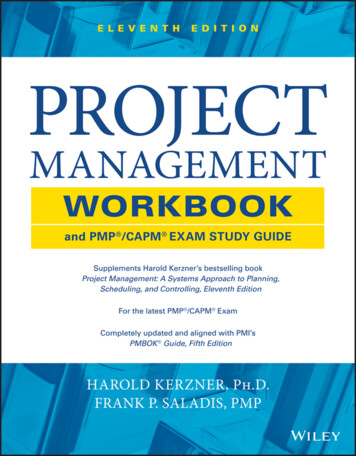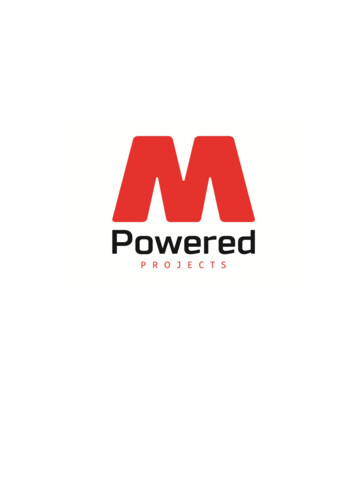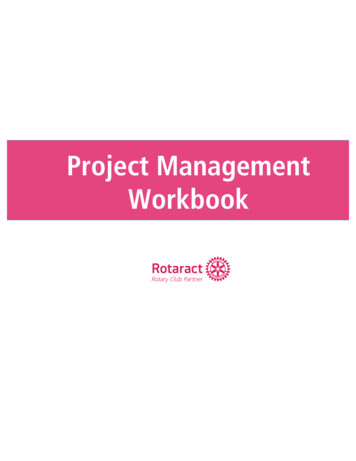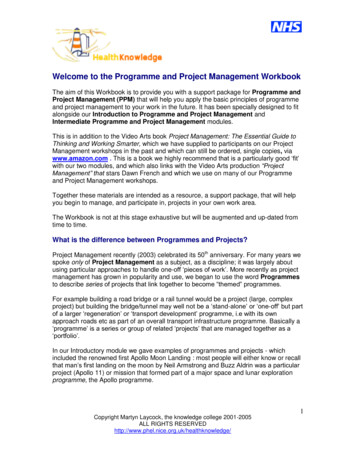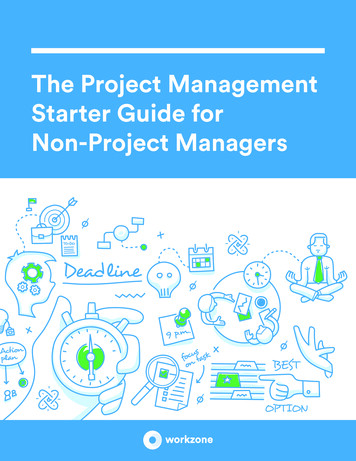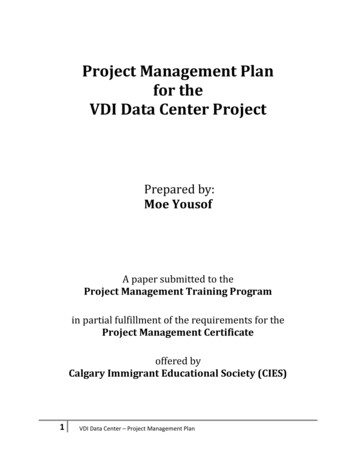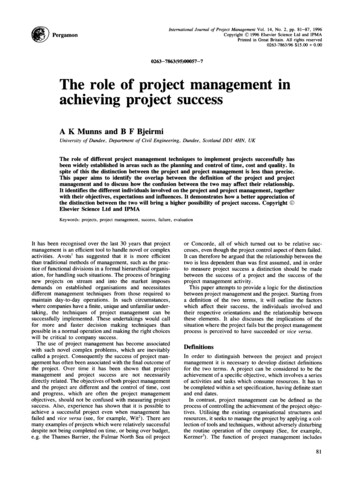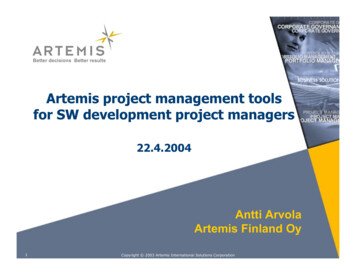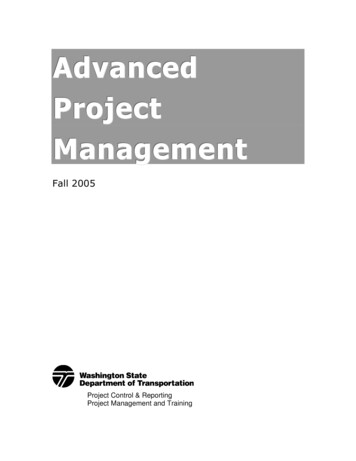
Transcription
AdvancedProjectManagementFall 2005Project Control & ReportingProject Management and Training
Advanced Project ManagementFall 2005Advanced Project Management (formerly MSSB)Course Title:Advanced Project Management (MSSB)Course Code:CPHDate:Location:Instructor(s):AFTER SUCCESSFUL COMPLETION OF THIS COURSE, THE CLASSPARTICIPANT WILL BE ABLE TO: Identify project team roles and method of project conflict resolution Plan and estimate percent complete for schedule and budget management Identify methods for schedule compression and/or recovery Develop Risk Management Plans Identify methods for budget and scheduling estimates Develop a resource histogram and balance resources Perform Earned Value analysis on an actively tracked project plan Successfully pass the Learning Assessment at the end of the courseResources / Manuals used:WSDOT Executive Order 1032.00E “Project Management”, dated July 1, 2005.WSDOT. “Project Management Process” training manual, 2005.WSDOT. “Intro to Project Scheduling” training manual 2005.WSDOT. “A Policy for Cost Risk Assessment”, dated August 2005.Project Management Institute. A Guide to the Project Management Body of Knowledge,3rd Edition (PMBOK Guide). Project Management Institute, Inc. 2004.Harold Kerzner, Ph.D. Project Management, A Systems Approach to Planning,Scheduling, and Controlling, 8th Edition. John Wiley & Sons, Inc. 2000.Velociteach. The PMP Exam, 2005 Edition. Andy Crowe, PMP. 2004.International Institute for Learning (IIL). Advance Project Risk Management” trainingmanual, version 4.0. International Institute of Learning, Inc. 2004iIntroduction
Advanced Project ManagementFall 2005Table of ContentsMODULE 1 – GENERAL PROJECT MANAGEMENT THEORY & SKILL . 1PROJECT MANAGEMENT BODY OF KNOWLEDGE . 1THE PROJECT TEAM . 2ORGANIZATIONAL INFLUENCES AND STRUCTURE . 5POWER . 7CONFLICT MANAGEMENT. 8TEAM ROLES . 9MODULE 1 REFERENCES . 12MODULE 1 EXERCISE . 13MODULE 2 – WSDOT PROJECT MANAGEMENT OVERVIEW . 15PROJECT MANAGEMENT POLICY . 15PROJECT MANAGEMENT PLAN . 20PROJECT PERFORMANCE BASELINE MANAGEMENT . 20MODULE 2 REFERENCES . 22MODULE 2 EXERCISE . 23MODULE 3 – SCHEDULE MANAGEMENT . 25SCHEDULE TERMINOLOGY & DEFINITIONS . 25SCHEDULE TRACKING . 29SCHEDULE RECOVERY / SCHEDULE COMPRESSION . 30MODULE 3 REFERENCES . 32MODULE 3 EXERCISE . 33MODULE 4 – RISK PLANNING & RISK MANAGEMENT . 35RISK DEFINITIONS . 35RISK TOLERANCE . 35WSDOT RISK POLICY . 37RISK PLANNING PROCESS . 38EXERCISE – RISK IDENTIFICATION . 39EXERCISE – RISK ANALYSIS USING 2X2 MATRIX (CONTINUATION OF EARLIER EXERCISE RESULTS) . 42EXERCISE – RISK RESPONSE DEVELOPMENT. 47RISK MONITORING & CONTROL . 48EXERCISE – MONTE CARLO SIMULATION . 49MODULE 4 REFERENCES . 50MODULE 5 – RESOURCE PLANNING. 51RESOURCE ESTIMATING . 51RESOURCE HISTOGRAM . 51RESOURCE CONFLICT AND BALANCING . 52MODULE 5 REFERENCES . 54MODULE 5 EXERCISE . 55MODULE 6 – BUDGET MANAGEMENT . 57BUDGET DEVELOPMENT . 57COST BUDGETING. 58COST CONTROL . 58MODULE 6 REFERENCES . 68MODULE 6 EXERCISE – EARNED VALUE AND RECOVERY METHODS. 69Introductionii
Advanced Project ManagementFall 2005AcknowledgementsPatrick Forza, PMP – Project Control & ReportingPatty Mutton, PMP – Project Control & ReportingStuart Anderson – Cost Risk Estimating & ManagementBill Elliott – OR Project Management OfficeiiiIntroduction
Advanced Project ManagementFall 2005(This page intentionally left blank)Introductioniv
Advanced Project ManagementFall 2005Module 1 – General Project Management Theory & SkillProject Management Body of KnowledgeWhile terminology may vary, the principles of project management are consistent. A projectmanager needs more than tools to succeed in delivering quality projects on time and withinbudget. Project managers with the knowledge and skill to lead a team toward a common goalwill optimize team member talents to the best benefit of the team.Project ManagementBody of KnowledgeApplication AreaKnowledge,Standards, owledge &SkillsUnderstandingthe ProjectEnvironmentPMBOK Guide, 3rd EditionThe Project Management Body of Knowledge (PMBOK) Guide describes the work planningprocess as defining and refining objectives and selecting the best alternative courses ofaction. There are many tools and techniques unique to project management; such as workbreakdown structures, critical path, or earned value. These tools and techniques alone are notsufficient without effective project management knowledge and skills. The project teammust recognize and use knowledge and skills from at least five areas of expertise:The Project Management Body of KnowledgeKnowledge unique to the project management field and overlaps other managementdisciplines.Application area knowledge, standards, and regulationsProject categories with common elements but not necessary in all projects1Module 1 – General Management Theory & Skill
Advanced Project Management Functional and supporting disciplines - legal, inventory management,personnel, traffic, right-of-way, environmental, etc. Technical elements – software development or ENGINEERING Management specializations – government contracting, new productdevelopment Industry groups – automotive, chemical, agriculture.Fall 2005Each of these areas typically have there own set of accepted standards and practices.Understanding the project environmentThe team needs to understand the positive and/or negative cultural, political, socialand environmental impacts the project may have and how people (customers,stakeholders, etc.) may affect the project.General management knowledge and skillsPlanning, organizing, staffing, controlling ongoing operations; including strategicplanning, accounting, procurement, human resources, information technology, etc.Interpersonal skillsEffective communication, getting things done, leadership, motivation, conflictmanagement, and problem solving.Each of these areas may appear to be discrete elements, but they generally overlap. It is notrequired that every team member be an expert in all five areas, the combined knowledge ofthe team leads to an effectively managed project.The Project TeamOrganization planning is a process that is primarily concerned with identifying and assigningroles and responsibilities for the project. Everyone on a project has a function or role and aresponsibility assigned to that role or function. It is important for the Project Manager toidentify these roles and help influence these team members in order to keep the projectrunning smoothly and ensuring project success.Identifying and defining these roles is a vital part of the “Initiate and Align” step of theproject management process.Module 1 – General Management Theory & Skill2
Advanced Project ManagementFall 2005Stakeholders ponsorSr. Mgmt.ProjectManagerƒManagersProject Team MembersFigure 1-1Project ManagerThe project manager is ultimately responsible for the project. This person usesorganizational resources to accomplish the project objectives. The project manager is“large and in charge” for the project. The project manager leads each step in theproject management process.Project SponsorThe sponsor and the project manager are the “owners” of the project. Usually, theproject sponsor will come from senior management, but can be the customer in somecases. The project sponsor is the person or group responsible for providing thefinancial resources (funding) for the projectSenior Management (Executive Management)Senior managers are the people above the project manager within an organization.Senior management will prioritize projects in the organization. Senior managementwill Initiate the project, which is the formal recognition that a project exists. Seniormanagers delegate project responsibilities and authority to the project manager.It is also senior management’s role to create a productive environment for the project,and to review and endorse the project management plan.Functional ManagerThe functional manager manages the specialty or specific resources required to createdeliverables required for the project. Project managers will coordinate and negotiatewith the functional managers for the resources needed for the project. Functionalmanagers are often involved in project planning and setting priorities for the project.3Module 1 – General Management Theory & Skill
Advanced Project ManagementFall 2005Project Team MemberThe group of individuals that is performing the work required for the project andproject delivery.StakeholderA project stakeholder is anyone with a particularly significant interest in the project’soutcome including those providing funding or right of way for the project andproperty owners who are affected by the project. Stakeholders are unique for eachproject and include anyone actively involved in the project and whose interests maybe positively or negatively affected by the execution or completion of the project. Astakeholder may also exert influence over the project and its deliverables.A project manager must manage stakeholder expectations, which can be difficultbecause stakeholders often have different or even conflicting objectives for theproject. A Project Manager will need to work with the project team and perform akey stakeholder analysis. Key stakeholders are those stakeholders who have a di
The Project Management Body of Knowledge (PMBOK) Guide describes the work planning process as defining and refining objectives and selecting the best alternative courses of action. There are many tools and techniques unique to project management; such as work breakdown structures, critical path, or earned value. These tools and techniques alone are not sufficient without effective project .
